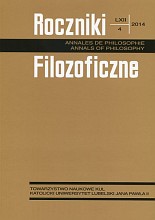Gilles Ménage i jego Historia mulierum philosopharum
Gilles Ménage and His Work Historia mulierum philosopharum
Author(s): Joanna UsakiewiczSubject(s): Philosophy
Published by: Towarzystwo Naukowe KUL & Katolicki Uniwersytet Lubelski Jana Pawła II
Keywords: Gilles Ménage; XVII century; woman; philosopher
Summary/Abstract: The article is devoted to French scholar Gilles Ménage (1613-1692) and his not extensive but impressive in its erudition work Historia mulierum philosopharum (1690). First of all, Ménage is known as the editor and the commentator of Diogenes Laertius, the author of esteemed works about language (for example: Dictionnaire étymologique ou origine de la langue françoise), and the poet writing in Greek, Latin, Italian and French. Historia mulierum philosopharum is the special work in his achievements. This writing was dedicated to Anne Dacier (1654-1720)—the famous French scholar and the translator of the classical authors. It presents biographies of women philosophers, some of them acclaimed, some others not as popular. The author concentrated on Greco-Roman antiquity, but he also wrote about the Byzantine era. The profiles of women philosophers are classified according to philosophical schools, beginning with those thinkers whose philosophical affiliation is unknown. The biographic entries have different sizes, but they follow the similar scheme: a name of a woman philosopher, her origin, the information about her life and achievements with erudite commentaries and acknowledgments. The number of sources is impressive. Plenty of works of the classical and contemporary to Ménage authors are cited. These many threads are broadly discussed in this article. First, the analysis of Ménage’s work Historia mulierum philosopharum shows the canon of available in the times of Ménage sources (of course on the condition that their user had some command of Greek and Latin). Second, it informs us how many classical texts were still published and commentated in the 17th century in the west of Europe as the continuation of the Italian humanists’ work. Third, it proves also that a presence of women in philosophy of the 17th century was, nonetheless, a peculiarity.
Journal: Roczniki Filozoficzne
- Issue Year: 62/2014
- Issue No: 4
- Page Range: 87-101
- Page Count: 15
- Language: Polish

